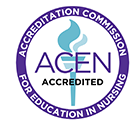Why Regis Online for Your DNP in Nurse Education?
*MSN to DNP Bridge program students may take up to 44 months to complete
**NFLP is offered to qualified students accepted into MSN-DNP Nurse Education program.
Nurse educators are critical to the success of our health care systems, as they prepare student nurses for careers in compassionate and life-saving work. However, according to the American Association of Colleges of Nursing (AACN), faculty shortages across the country are limiting student capacity at a time when the need for professional registered nurses continues to grow.
The AACN recommends that nurse educators complete a graduate-level degree, such as a Doctor of Nursing Practice (DNP), because it prepares them to attain a firm grasp of the core professional competencies that are central to developing, implementing, managing, evaluating, and improving nurse education programs in various settings.
Our online MSN-DNP Nurse Education program includes a competency based curriculum that prepares for all modalities including online, simulation and traditional. The program is designed to provide the knowledge, skills and attitudes needed today to support desired learning outcomes, provide critical feedback and effectively educate the ‘nurse of the future’.
Regis College offers Nurse Faculty Loan Program (NFLP) to qualified students accepted into MSN-DNP Nurse Education track. Loan recipients may get up to 85% of their loan cancelled. Learn more.
![]()
Hear From Our Students
“My experience in this program exceeds my expectation of earning the DNP degree. I’ve gained a lot of knowledge from the course work of this program as well as from the faculty.”
Oluwatoyin Okafor
Online MSN to Doctor of Nursing Practice Program (Nurse Education)
Nurse Education by the Numbers
80,000
The number of qualified applications who were turned away from baccalaureate and graduate nursing programs in 2019 due to an insufficient number of faculty. (AACN)
7.2%
The national nurse faculty vacancy rate, according to a report released by AACN in 2019. 89.7% were faculty positions requiring or preferring a doctoral degree.
72,600
The estimated number of postsecondary nursing instructors employed in the U.S. (BLS.gov)
+22%
The projected employment growth of nursing instructors from 2020-2030, faster than the average of all occupations.
What Can You Do With a DNP Degree in Nurse Education?
Exposure to the advanced theoretical and clinical concepts featured in the DNP curriculum can help graduates qualify for advanced positions in academia as well as clinical training and development programs. As nurse educators, they use their advanced expertise to teach nursing students and practicing nurses the knowledge and skills necessary to attain higher education degrees or certifications. They design education programs, implement teaching methods to support desired learning outcomes for students, and provide critical feedback along the way.
- Designing course curriculum
- Evaluating and updating current educational programs
- Conducting lectures
- Designing assignments and test to assess student learning
- Mentoring and advising students with constructive feedback
- Facilitating guided classroom discussions
- Leading clinicals to help develop students’ practical skills
- Contributing to scholarly work
Where Do Nurse Educators Work?
With a national shortage of nursing faculty and a wave of Baby Boomers nearing retirement, nurse educators are in higher demand than ever. That means DNP degree holders who specialize in nursing education can take their teaching expertise to a variety of settings, including:
- General medical and surgical hospitals
- Psychiatric and substance abuse hospitals
- Privately owned practices
- Junior colleges
- Four-year colleges
- Universities
- Technical and trade schools
- Distance learning programs
- Long-term care facilities
- Community health agencies
About Regis
As a leader in education, Regis is dedicated to offering programs with a holistic view of health care that are designed for the future of the field. Through cutting-edge coursework, industry-active faculty members, and an array of majors and graduate programs, Regis has been able to positively impact the educational community, health care landscape, and personal lives of students nationwide.

Regis College is accredited by the New England Commission of Higher Education

Accredited by the Accreditation Commission for Education in Nursing (ACEN)

Designated as a Center of Excellence in Nursing Education by the National League for Nursing 2008-2020

Among The Princeton Review’s
“Best Regional Colleges”

Ranked among the Top 25 Fastest-Growing Colleges by The Business Journals



